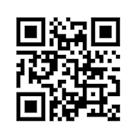

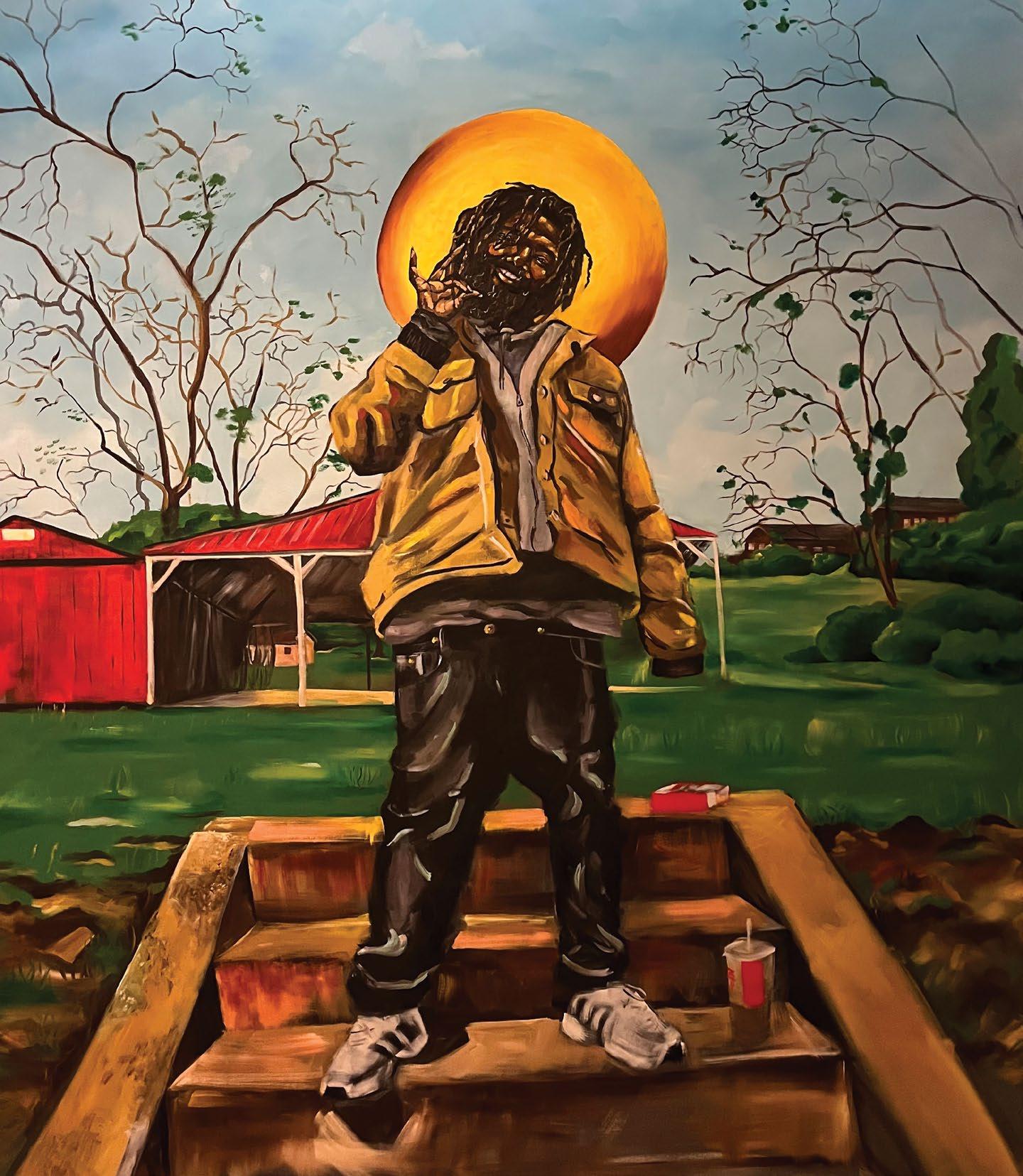








Contributor Board
Amber DuVentre, Chair
Christine Doeg, Secretary Wade Nelson Jr., Treasurer
Kerry Graham, Demetria Kalodimos, Robin Kimbrough-Hayes, Jim Shulman Drew Morris
Contributors This Issue
Maurice B. • Shawna B. • William B. • Omari Booker • Mccollonough Ceili • Chris Scott F. • Mark Forshaw • FreepressGMA • Ben Gibson • John H. • Sean L. • Mr. Mysterio • Joe Nolan • Jekaterina Schneider • Judith Tackett • Lora V.
Contributor Volunteers Ann Bourland, Andrew Kuluk, Andy Shapiro, Deborah Narrigan, Jamie Dore, Logan Ebel, Loren Montoya, Marissa Young, Matthew Murrow, Michael Reilly, Susan Richter, Tyler Samuel

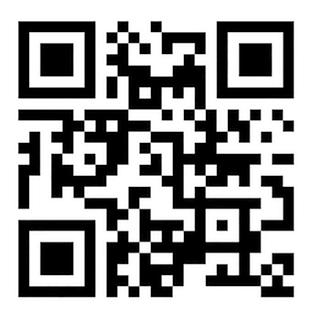
Venmo has canceled our account, but you can still pay using Square! You must identify your vendor so we know where to send the payment. Here's how:
Use your phone camera and scan the code on this page or on the top left corner of the cover of this paper. This will take you to the landing page: thecontributor.org/pay.
Type in the amount you wish to pay. The paper costs $2. Tips are welcomed. Vendors get paid by the next business day.
Vendor Program Manager
Lindsey Longoria Housing Stability Guide
Zero Mannino Housing Stability Guide
Raven Nye Director of Quality and Training Jay Smelley Administrative Coordinator
Andrew Terry IV Program Operations Team Lead
Carli Tharp Housing Stability Guide
Barbara Womack Advertising Manager
Will Connelly, Tasha F. Lemley, Steven Samra, and Tom Wills Contributor Co-Founders



Since The Contributor started in 2007, more than 3,200 different vendors have purchased $2.3 million worth of The Contributor and sold over six million copies, generating over $15 million in income for themselves.
In 2019, our C.O.V.E.R. Program (Creating Opportunity for Vendor Employment, Engagement, and Resources) was the natural expansion of our mission of removing obstacles to housing. We now offer full case management, assistance with housing and rental expenses, addiction recovery, health insurance, food benefits, and SSI/SSDI
Editorials and features in The Contributor are the perspectives of the authors. Submissions of news, opinion, fiction, art and poetry are welcomed. The Contributor reserves the right to edit any submissions. The Contributor cannot and will not endorse any political candidate. Submissions may be emailed to: editorial@thecontributor.org
Requests to volunteer, donate, or purchase subscriptions can be emailed to: info@thecontributor.org
Please email advertising requests to: advertising@thecontributor.org
The Contributor P.O. Box 332023, Nashville, TN 37203
Vendor Office: 615.829.6829





Retired Contributor vendor Calvin Brooks, born Nov. 24, 1957, in Columbus, Ohio, entered into eternal rest on Sept. 1, 2025, at the age of 67.
At The Contributor, Calvin was known for his smile and a persevering attitude of never giving up.
“Beyond his work with The Contributor, he always had a side business, once proudly handing me a card for his headlight and window-washing service, which I thought was ingenious,” Cathy Jennings, director of finance at The Contributor. “He was never afraid to share his thoughts, whether about the newspaper cover or new marketing ideas. Calvin’s joy was infectious, especially when he spoke about marrying his beautiful wife.”
Calvin often credited his success to his faith in God, sharing scriptures and thoughts
about religion with folks often. His favorite scripture was Luke 1:37: “For with God nothing shall be impossible.” This verse reflected how he lived his life — trusting God, serving others, and walking boldly in faith.
He passed thousands of Bible tracts around the Nashville and Franklin areas, and always felt deeply fulfilled after sharing his faith.
“Calvin loved Christ and loved people,” reads his obituary. “He enjoyed sharing God’s Word with all he met and found joy in connecting with his community, including selling The Contributor newspaper. His heart for service and his genuine care for others left a lasting impact on many lives. Calvin was an entrepreneur who set up several small businesses, including window washing, Bible Verses on Wood, headlights restoration and also a food vendor among others.”
Brooks attended Main Street Elementary in
Report Highlights Economic Disparities
While Tennessee continues to experience tremendous economic growth, many residents are struggling to make ends meet, according to a new policy brief Thriving State, Strained Households by nonpartisan think tank ThinkTennessee. The analysis highlights where and how our economy is thriving — Tennessee is now the 15th largest state by population and employment and 17th largest economy by GDP — and where Tennessee workers are being left behind, according to a release. The brief summarizes findings and policy recommendations from the comprehensive State of Working Tennessee report, also released by ThinkTennessee. “Tennessee’s economic ascent is undeniable — but that success should be lifting more Tennessee families,” said Erin Hafkenschiel, president of ThinkTennessee. “Too many households are falling behind as costs of living skyrocket. Thoughtful, innovative policies to ensure Tennesseans have access to high-quality, high-growth, high-wage jobs can help spread economic prosperity more equitably across our state.” STAFF REPORTS
Trump deploys National Guard troops to Memphis for anti-crime task force
President Donald Trump Monday directed Tennessee’s National Guard deployed to the Democratic-led city of Memphis, following similar actions in the District of Columbia that Trump has said were needed to tackle crime. “We’re going to make Memphis safe again,” Trump said. It’s the latest test of Trump’s presidential powers in using the U.S. military domestically, despite a law that bars soldiers from partaking in local law enforcement. Trump said his efforts in the district — using the National Guard — would be replicated in cities across the country. In the Oval Office, flanked by Tennessee’s GOP Gov. Bill Lee and the state’s Republican U.S. senators, Bill Hagerty and Marsha Blackburn, the president signed a presidential memorandum to establish a “Memphis Safe Task Force” to address violent crime using federal law enforcement and
agencies. “We’re sending in the big force,” Trump said. In addition to the National Guard, the task force will include the U.S. Marshals Service, FBI, Drug Enforcement Agency, Homeland Security Investigations and U.S. Immigration and Customs Enforcement agents. It’s unclear how many Guard members or members of federal law enforcement will be sent. “This task force will be a replica of our extraordinarily successful efforts here, and you’ll see it’s a lot of the same thing,” Trump said of using the National Guard in the district. It’s the first time Trump has sent the National Guard into a red state, after seizing control of the California National Guard from the state’s governor — a Democrat — for deployment in Los Angeles, and then sending Guard members to the district, another Democratic stronghold. While homicide rates remain high in Memphis compared to the nation, murders overall from 2023 to 2024 have decreased by 14%, according to the most recent data from the Memphis Shelby Crime Commission. The Memphis mayor’s office could not immediately be reached for comment. Trump added that St. Louis, Missouri, could also see similar action. The dispatch of the National Guard to Tennessee comes after Trump has threatened to send troops to other cities including New Orleans; Portland, Oregon; and Chicago. Illinois Gov. J.B. Pritzker pushed back and the president had backed off his threat, though he mentioned the city again on Monday. Governors have control over their state National Guard except in rare circumstances where the president can seize control. Pritzker has repeatedly rejected the idea of sending the National Guard into Chicago. “If we don’t have the governor’s help we’re doing it without him,” Trump said of Pritzker. With Memphis, Lee welcomed the intervention and thanked Trump for directing federal resources to the city. “We are very hopeful and excited about the prospect of moving that city forward,” Lee said.
ARIANA FIGUEROA | TN LOOKOUT
TN DOE Mum on Voucher Program Data
Months after Tennessee launched its first statewide voucher program, the Tennessee
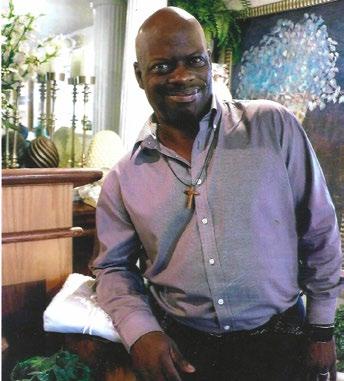
Columbus, Ohio, and later joined Walnut Ridge High School, where he was among the first Black students to attend. As a teenager, he also worked at Bob Evan’s Restaurant, beginning
Department of Education won’t say how many students are using it to attend private school. The department has declined to release basic information on enrollment, delayed public records requests, and blocked attempts by at least one lawmaker to gather data on the program approved by Republican lawmakers in January. The lack of information has shrouded the rollout of Gov. Bill Lee’s signature voucher program, which is expected to funnel more than $146 million of taxpayer money to private schools, and makes it difficult to determine whether the quick implementation of the program is working as intended. It’s also the latest transparency issue for the department, which drew criticism earlier this summer after Chalkbeat Tennessee reporting revealed Tennessee would not explicitly track how many vouchers will go to students already attending private schools. Tennessee launched the universal voucher program application in May with significant fanfare. Lee, in a joint statement with the department, touted a “remarkable response” to the program, citing more than 33,000 applications submitted within hours of launch. But since May, the department has refused to release further data. The education department did not respond to multiple Chalkbeat Tennessee requests this summer for specific numbers regarding acceptances, denials and applications submitted in the “income-limited” category of the program. Commissioner Lizzette Reynolds told reporters in July that additional data on Education Freedom Scholarships enrollment would be released in August. None was published. On Tuesday, the department again declined to answer specific Chalkbeat Tennessee questions, including how many students were enrolled in the program as of Sept. 1 and how many are currently waitlisted. A department spokesperson said additional information would be provided in “the coming days” and again pointed to numbers on applications, rather than data on actual enrollment in the program. “The department looks forward to sharing data from the Education Freedom Scholarship (EFS) program for the 202526 school year in the coming days,” said Maggie Hannan, communications director for the TDOE. “It’s important to note that with more than 42,000 applications, approximately 50 percent were sub-
a lifelong journey of hard work and service. He was preceded in death by his father, Eugene Brooks; his mother, Carol Wilson; his devoted and loving wife, Rodah Brooks; and others who went before him.
Calvin was proud of his life as a small business owner, and was proudly recognized as the first Black Petition Coordinator. He answered a higher calling as an ordained minister of the Gospel of Jesus Christ, and faithfully served as a greeter at his church home, Regeneration Nashville.
He will be remembered as a man of strong faith, unwavering dedication, and endless compassion. Though he will be deeply missed, his legacy of love and service will continue to inspire all who knew him.
“The world will feel different without Calvin’s energy, but I know he is welcomed wherever he is now,” Jennings says.
mitted by families with a qualified income. This remarkably strong response demonstrates what Gov. Lee has known all along: Tennessee parents want choices when it comes to their child’s education, regardless of ZIP code or income level.” The department has delayed fulfilling Chalkbeat Tennessee records requests filed in early August, which are still outstanding. It also knocked down data requests filed by Rep. Caleb Hemmer earlier this summer. Hemmer, a Nashville Democrat, said last week he is considering filing a lawsuit against the department to push for more transparency. “It’s a continual theme of not following the law and having to take extreme steps to correct that. It’s so frustrating,” Hemmer said. “Our kids deserve better, Tennesseans deserve better. It overshadows the good work that the department and department employees do for our kids.” The department has denied Hemmer’s request for residency data of student applicants. Hemmer said he filed a records request after learning the department was not collecting data on whether applicants already attended a private school when applying for the voucher. “After getting the application and looking at it, I was surprised to learn that they left out this key piece of information,” Hemmer said. “So, I wanted to see for myself what the data looked like. I wanted to see how many of my constituents applied.” The department has cited student privacy laws, though Hemmer believes the data could be released as “directory” data. “Our education attorney’s review found that they had a different opinion of what should and shouldn’t be public,” Hemmer said. Deborah Fisher, executive director for the Tennessee Coalition for Open Government, said that while it’s not unheard of for a state lawmaker to “tangle” with a state agency to get information, it is not often that a lawmaker sues for the information. But Fisher said the months of silence from the education department is “unusual.” “To get just radio silence on the governor’s signature program is unusual,” Fisher said. “You should be able to get basic government data. This is government money, this is taxpayer money. You should be able to get basic information.” This story was originally published by Chalkbeat, a nonprofit news site covering educational change in public schools. MELISSA BROWN | CHALKBEAT



Ashley Bachelder did not expect that she would ever become the interim director of the Metro Arts Commission. After serving as the director of policy and research at the Metro Human Relations Commission for a little over two years, she took over the lead role at the Metro Arts Commission.
Bachelder’s background is in public health and community organizing. She taught at university medical centers in Arkansas and at Vanderbilt and led community organizing initiatives that promoted public transit, workers’ rights, tenant rights, affordable housing, and racial justice. Prior to starting with Metro government in September of 2022, she served as the co-director of Workers Dignity and then as the lead organizer for Showing Up for Racial Justice.
While Bacheder doesn’t currently work directly with housing efforts, she said she believes it’s one of Nashville’s most urgent issues.
“I don’t work in this space anymore, but I will likely always believe that access to safe and stable housing is the core of our ability to exist,” she says. “A person’s housing situation affects everything. It affects opportunities that you have. It affects your health. It affects your safety. It affects how you build community.”
Bachelder’s appointment to head up the Arts Commission in January 2025 came after a highly publicized breakdown in leadership at that department. The Metro Human Relations Commission (MHRC) is the agency that receives complaints about access to public services or discrimination. Near the end of 2023, Bachelder was assigned as MHRC’s lead investigator following a complaint against the Arts Commission about the distribution of grant funding.
Over the next months, she became extremely familiar with the Metro Arts Commissions and its processes, which made her a natural choice when the commission’s first interim director abruptly resigned this past January.
The commission has not officially started the search for a permanent director yet, but Bachelder said they were likely to bring in a new director in spring. At this point, she does not plan to throw her hat into the director-search ring.
How would you describe your leadership style, and where do you think you can make the biggest difference?
My style is strong in coaching and managing. I am strong in making an assessment in a situation or thinking through things as a system from an execution perspective. I am not a visionary leader. I don’t always enjoy being the person to set visions, speaking about that and rallying a crowd. I enjoy helping other people in their roles and helping them execute an idea.
What are the main goals for Metro Arts Commission during this interim directorship?
I’m sure you’re aware of at least the high-level turmoil that has gone on here in recent years.
BY JUDITH TACKETT
A few years ago, Metro Arts, in good faith and in good policy, redesigned our grants program. One of our core functions is providing resources to arts organizations and to artists. Of course, our mission is about providing opportunities for every Nashvillian to have access to a creative life. We do that through a variety of ways, but one of the key ways is our grants program.
As a growing city, the art scene here in Nashville has been expanding and changing and shifting for years. Previous leadership before me did a lot of work in really thinking about how our resources are reaching folks who haven’t had access to these resources before. And so, some new priorities were set to distribute funds a little differently than they had been before [and] to distribute them to people who hadn’t had access to arts grants and arts opportunities before. That policy vision was developed through a participatory process, and I fully support that vision, but it wasn’t implemented well. A lot of the headlines over the last couple of years are about delays and payments not coming through, or payments being not the amounts that people expected.
When I came in, I knew that I wanted to continue to find ways to carry out this policy objective, which is spreading our resources to those who have traditionally not had access to them and finding ways to improve the operations. And so, my focus has really been on quality improvement and setting up systems. Because the thing that came with expanding access to these funds is this huge growth in our programs.
The Thrive grant has been talked a lot about through these changes that went from funding 22 artists one year to 101. And right now we have 275 applications. Now we’re working on processing how we support the increase in grantees, what do we need to do on the staff side in order to have a process that stays on time, that works, that delivers what we say that we’re going to deliver.
All of that to say, my focus has been on creating systems, improving communications, really knowing that public confidence and public trust in a process is being able to carry through on the operations of what we say we are going to do. And so, it’s very important to have public engagement through this process. I’ve tried to hold as many opportunities as possible to be super public and transparent about what we are doing. For my first two months in this job, I did a weekly drop-in at different public locations where people could come talk to me as the new director, whether it’s a compliment, a complaint, a question. We also did a number of listening sessions – report backs is what I call them. [And I wanted to narrate] what’s going on at Metro Arts over these last few months as we’ve got the grants back up and going, because there was that period of over a year where there was just nothing that was happening publicly with the grants.
I’ve also had a great opportunity to make some new hires on our team. We’ve got an amazing team, but I think that gets not shown
enough because of all of the turmoil and all of the drama. But we’ve got really incredible people that are committed to this work on behalf of Metro.
How big is your team?
When we are fully staffed, we have 15 team members. And we are not fully staffed right now, but I expect to be by the end of the calendar year.
What’s your budget?
If you look in the Metro budget book, our annual operating budget is about $5.5 million. About $3.2 million of that is our grant budget every year. So about $2 million for staff and other operations.
You hold a graduate degree in public health. What made you choose that field and how did you end up with the Metro Human Relations Commission?
I grew up in a working-class family where access to healthcare was a big thing. My father worked in a factory. His father worked in a factory … and my mother worked at Walmart. … and access to health care, because of their jobs, was a big thing for us growing up. My parents eventually divorced, and they should have done it a lot sooner, but they didn’t because of access to health care. And so I always saw access to health care as a big through-line in my childhood.
So, I went into public health, but my focus has not been in healthcare. I actually expanded my view of health and how we create health in communities through my degree, but also my applied experiences.
Let me share a short story: When I was in my last year of graduate school, I was walking to class one day and somebody handed me a flyer and told me that my university was expanding and was going to knock down 250 houses around the university’s footprint, and this was a terrible thing. I ended up spending my graduate thesis on doing a whole thing around how displacement is about public health. That changed my public health trajectory, where I spent the next several years growing my knowledge about what is community organizing because the community actually fought back against my university and stopped the expansion. And actually, the neighborhood is still there 15 years later right now.
[I started] looking at community organizing as public health. And I’ve had this weird career trajectory where I’ve called myself a public health practitioner, but it has been through these social issues that we organize around, whether that’s been around transit rights, which I’ve done through work in Nashville, eviction prevention, or workers’ rights. So, it started for me as access to healthcare. It expanded to me as everything is public health, the social issues that we experience, and the inequities that we see in our communities.
I came to MHRC 15 years later, after that story that I just told, never ever expecting that I would come work for the local government because I’d call myself some days an organizer
or an advocate or an agitator on the outside. But my phase of life changed, and I was looking for a different strategy.
I have always believed in the importance of inside-outside strategies. So for years I worked as somebody on the outside, but I know that we need people inside the systems that we’re trying to make work better. Thinking about Metro, it’s the system that we have the most control over, especially in these times that we’re living in.
I think being able to be part of the local government that has the closest and most direct impact on people’s lives is the space where we can make change if you can tolerate working inside the system. It’s frustrating to work in the system. At Metro Arts right now, I oversee a process where we distribute over $3 million to communities. That is how I am existing in our local system, trying to align values with my own values that I have, trying to be transparent, and trying to make the system work better for people.
We’ve talked about your background in community organizing. What wins in these areas would you like to highlight from the past few years? And what are the biggest challenges?
That’s a hard question. Thinking about when I was doing direct community organizing in these spaces feels like an entire lifetime ago these days. I’m more of an observer on this right now than an active participant.
But observing how these different groups that you named here — folks who are really focused on transportation issues like safe street issues, focused on housing and homelessness, focused on economic justice – the issue of surveillance has been one that’s brought a lot of these different groups together as we’ve seen the [Metro] Council debate different things like Fusus or license plate readers in the last couple of years. And I think right now, given the changes in levels of government that are above us, that are harder to impact, the way that we’re talking about issues at the local level is changing to reflect that.
There is coalition building happening right now that is ultimately going to serve all working-class people better when we think about the intersecting issues that affect folks. And so, in the last year, I think a community organizing win was the slowing down of the surveillance legislation that was being proposed and being more hesitant in how we think about some of those things that were being proposed for public safety and the intersectionality between social issues.
We know that from higher levels of government, we’re not likely to have increased resources. And I think at the local level, our focus has to be on maintaining as much as we can to allow people to live with dignity during these times where there might be fewer resources available. What can we do at the local level to not make things harder for folks? That’s our responsibility and our duty at the local level when we think about these resources and things like that.
Written by Chris Scott Fieselman, Vendor #0015
Nobody home. Open the door. Beyond the unknown. Behind like before. Like first having sight. Everything is all right. When you step on, Inside of your mind...
Travel the path of dreams and desires, Then come to the forest of fears. Conquer the forest, And then what awaits you, Is crossing the river of tears. Forever good-byes, Failed though you tried, Should have been’s, And remember when’s, If only I had, Hurt, upset and sad. Across the river, On the other side, Is a tunnel, Beyond which, Appears a small light. Contained in the tunnel, Lie questions unanswered, Thoughts lost, That have never been found. Once inside the tunnel, Alone in the dark, Somehow driven on, Though confusion abounds. Asking who, what, where, When, why and how. The light is the only thing, Guiding you now. Growing ever closer, Ever clearer with each step. Though time is getting short now, And you haven’t gone far yet. You start to run and falter. As if too much too fast. The things, You should have altered. The answers that you’ve passed. The light is very close now, And it sits above a door. You open it and step inside, A place you’ve been before. This can’t be all the reason, Why you’ve journeyed all that way. You came to find forever, And only found today.
Good Morning.
Written by Chris Scott Fieselman, Vendor #0015
Talking ‘bout the work doesn’t get it done... Doing the work gets it done... Take on that challenge or turn tail and run? A waste of talent or learn failure’s not an option? You’ll never finish or see its completion, A work that was never begun.
Talking ‘bout the work doesn’t get it done... Doing the work gets it done...
Have you ever pulled nails? From the boards of a pallet? And all that good, usable, wood that you get? I pictured something, you’d never expect? A tent off the ground, raised up on a deck, To protect it from, Inclement weather’s effect.
A part of a start that’s not all that far, From nowhere land to possible prosperity. For lost souls longing for an opportunity, In search of and looking for a community. With convenience and comfort, Comes responsibility. Learn to earn it, Because nothing comes free. Except maybe, Apprentice Carpentry.
I’m willing to learn to earn it, From someone who’s willing to teach me? If the homeless and unhoused, Can’t turn it around, Is it best they just get it for free? Is there no such thing as common ground? For those willing to earn their keep? When all they’re in search of?
Is a place to lay down in peace and go to sleep? Like that campground they tore down, At Fort Negley.
I watch the sun rise, From the East to the West, And every day - Seems like another, Challenge or Conquest. I watch the sun set, And bring on the night. Lord... What did I do wrong today? And what did I do right?
Talking ‘bout the work doesn’t get it done... Doing the work gets it done... Take on that challenge or turn tail and run? A waste of talent or learn failure’s not an option? You’ll never finish or see its completion, A work that was never begun. Talking ‘bout the work doesn’t get it done... Doing the work gets it done...

ACROSS
1. *Maze plant
5. Wharton degree, acr.
8. Special effects in “Avatar,” acr.
11. Dwarf buffalo
12. “On Golden Pond” bird
13. Isolated
15. Atomizer output
16. Enthusiasm
17. Pueblo people, pl. 18. *Pre-game party (2 words)
20. Doomsayer’s sign 21. Perfume bottles
22. Tombstone acronym
23. Construction binder
26. “____: The Movie,” 2002 slapstick comedy
30. Genetic info carrier, acr.
31. Dorsa, sing.
34. “He’s Just Not That ____ You”
35. *Like some sweaters
37. Earth Day mo.
38. Opposite of cation
39. “Que Sera ____”
40. Approved
42. Denotes middle
43. Assess pro rata
45. Lorraine’s neighbor
47. Doctor Dolittle, e.g.
48. Temporary stay
50. Chicago’s Navy ____, tourist destination
52. *Popular fall spectator sport
55. Hutu’s opponents, 1994
56. Quinceanera or bat mitzvah
57. Biblical captain
59. Rocky ridge
60. Having wings
61. Russian parliament
62. Diamond or ruby
63. An affirmative
64. Dog command
DOWN 1. Cameron, to friends
2. The Fonz: “Sit ____ ____!”
3. Civil rights icon Parks
4. Richard Wright’s “____ Son”
5. Relating to mole
6. Whatever rocks them!
7. “Green Gables” protagonist
8. Walking helper
9. Smiley face
10. “____ Now or Never”
12. Smooth, in music
13. Before appearance of life, geology
14. *Patch purchase
19. ____ Hop dance
22. Ewe’s mate
23. *Like air in fall
24. Keyboard key
25. Introduction to economics
26. Twelve angry men, e.g.
27. Carl Jung’s inner self
28. Indifferent to emotions
29. Type of probe
32. *Leaf collector
33. R&R stop
36. *Bushels of apples, e.g.
38. Impromptu
40. Over the top, in text
41. Time for an egg hunt
44. Falcon’s home
46. Uses two feet
48. Bridal veil fabric
49. Smidgins
50. Unadulterated
51. Individual unit
52. Brawl
53. Clod
54. Tibetan priest
55. Chasing game
58. *Cushion on a fall ride


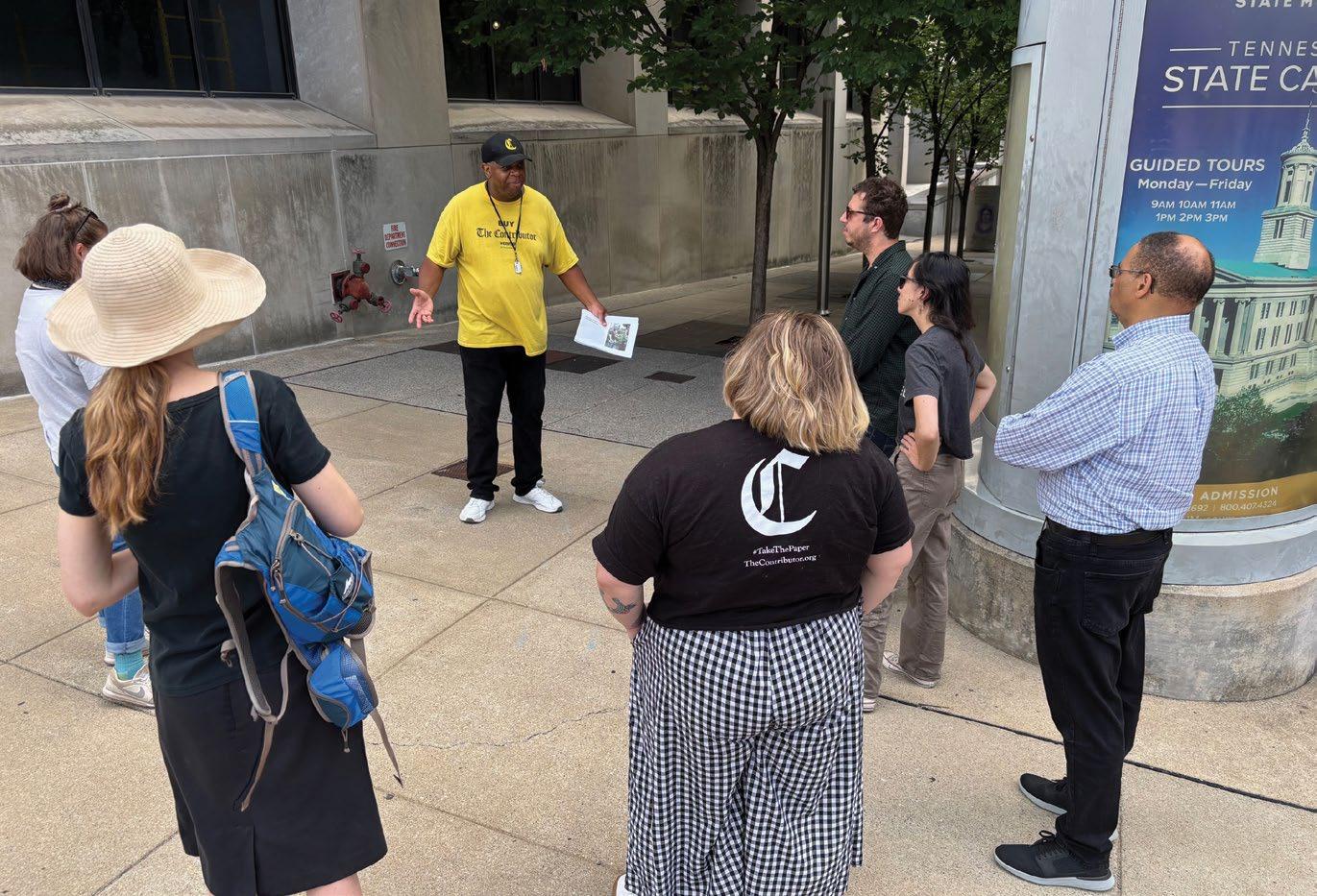
The Contributor launches tour led by street paper vendors to help folks see the city through a different lens
The Contributor has launched Unseen Nashville, its new walking tour in Downtown Nashville, which highlights the views and personal stories of trained guides with lived experience who are also Contributor vendors.
Unseen Nashville was developed by The Contributor’s Vendor Leadership Team, four of whose members immediately signed up as tour guides. The vendors have been actively shaping Unseen Nashville from the beginning.
Unseen Nashville is a social city walking tour that takes folks through a mile of Downtown Nashville. This is a tour about homelessness given from the viewpoint of a person who has lived through it.
Participants will have an opportunity to learn what it means to be unhoused and unseen. The tour will happen rain or shine (except in dangerous inclement weather), and people need to be prepared for heat and cold — and the noise that Downtown brings. These are all things that people who are unhoused often cannot escape.
Through personalized stories, the Unseen Nashville tour will offer data and context, cover policies that shape where people can go, highlight the importance
BY JUDITH TACKETT
of places like the Downtown Library, and discuss access to transportation, food and services. Unseen Nashville guides will also talk about solutions — and those that may not work so much — like criminalization of homelessness.
Unseen Nashville tour guides include Lisa Abell, Keith Doering, Shawn Lesley and Pedro Lopez. I asked some of them why they signed up as tour guides.
“I want people to be aware of homelessness and how it works in Nashville,” Keith said.
And Pedro added, “The proceeds help the homeless. And that’s something that I’m passionate about, the homeless.”
Tour guides will be paid an hourly living-wage rate, including the time it takes them to travel to and from home. In addition, we will encourage participants to purchase a newspaper or zine from them at the end of the tour.
Shawn said he signed up as an Unseen guide, “because I felt like I was treated wrong, coming back to my hometown, and I don’t want others to be mistreated just because they’re homeless, and they can’t make it or
feel like they wish that someone was there.”
He explained that in his view, the Unseen Nashville tours will help people see that there are folks — like the tour guides — who are trying to make a difference.
“We’re trying to change things and make things better for all of us,” Shawn said, adding that he wants “for the next generation to come along to say, ‘Hey, I heard The Contributor and Unseen is helping people. They’re trying to better things.’”
We also asked the three tour guides who were present at our last meeting what experiences they would like for tour participants to learn about through Unseen Nashville.
“My experience was rough,” Shawn said. “Being homeless on the street, down in the rain, snow, heat, all day, every day, that takes a toll on you. Especially when you’re dealing with depression. And it’s all mainly depression that everybody deals with.”
Keith said he wanted participants to understand, “that it’s very easy to get into homelessness because many people are one paycheck away from being homeless.
“I mean, a lot of people have no savings at all, no emergency fund,” he said. “If they get
sick for two weeks and can’t work, they risk being homeless. It’s not simple to get back on the train. You can fall into homelessness in one day, and it could take you one year to get to climb back out.”
And Pedro added, “There’s a lot of homeless that are unseen. And we need to see them.”
Keith said he hopes by the end of the tour participants will realize that many people have it worse than they do.
“You see an injured cat on the sidewalk, and everybody wants to pile in and help, but they’ll step right over a person wrapped up in a blanket when it’s 20 degrees and won’t even look at him,” Keith said. “So I want people to get more compassion for other people that have it worse than they do.”
Pedro added that showing compassion means a lot. “Just last week somebody gave me a sleeping bag, and I saw somebody who was just lying on the ground. I gave him that sleeping bag.”
All of the tour guides are currently in housing, and thanks to their work with The Contributor as independent vendors, they have been able to supplement their income and maintain housing.

Vendor Tour Guide Pedro:
“There’s a lot of homeless that are unseen. And we need to see them.”
Gerald B., who is working on housing and is interested in becoming a tour guide, said he hopes Unseen Nashville will help, “make people aware and give them an avenue to help if they so choose.”
My work with Unseen Nashville was an effort to ensure people from churches, schools, tourists, politicians, businesspeople, and even folks working in the nonprofit sector are given a different viewpoint. I believe we have stigmatized homelessness to the point that even when we mean well and want to include the voices of people with lived experiences, we still create barriers in doing so.
Their stories are too often told through someone without lived experience — including including the author of this feature. That’s why it is important for me to continue to find ways I can help people get heard directly without me or anyone else as a filter for their message.
But I am proud of the fact that this is a tour created by the people who have gone through the experience of homelessness. Participants will learn directly about what it actually means to be homeless in Nashville — or many other cities, for that matter. And as we continue doing the tours, I am convinced that as the confidence of our guides grows, each tour will become increasingly individualized based on the engagement and back and forth with the audience.
At the same time, we also need to be clear that this is still a tour that helps promote The Contributor whose purpose is to create community. Building community means that people feel comfortable with others. They feel heard. That’s why there is a newspaper whose content is driven by vendors who sell it on the streets. Unseen Nashville is another such product and there will be some consistency in how we talk about The Contributor’s work, the different products, and services.
Each tour will be led by one of the Unseen guides,
accompanied by either Will Connelly or myself to help out with logistics and some facts and policy questions.
The vision of Unseen Nashville has been simmering with The Contributor for a long time — ever since the organization’s co-founder, Tom Wills, participated in a similar tour in Athens, Greece. Then, in May 2022, I went on a social city tour in Basel, Switzerland. It was an hour-long street tour led by Benno Fricker, a vendor of a Swiss street paper. You can read about that experience in the issue published in Contributor Vol. 16, No. 13, in June 2022..
When I returned to The Contributor, Tom, Cathy Jennings, and I started exploring opportunities to introduce a street tour led by The Contributor right here in Nashville. With Will Connelly coming on as the new executive director, we seriously started our planning and training with the Vendor Leadership Team.
As part of the tour guide training, we have conducted a few practice tours over the summer, which provided invaluable input for improvements. Our Unseen Nashville tour participants also left us with some encouraging feedback, such as:
• I think this is a very useful tool to educate and/ or inform the public, especially people who are not familiar with Homelessness. Great project. Thank you.
• I loved the tour. I’m so excited that Nashville will be offering these soon!!
• I loved starting at Church Street Park, then moving to the Capitol, the WeGo station, and ending at The Contributor. Wonderful stuff.
• This is such an important and impactful opportunity, and I am grateful The Contributor is leading this work.
Large groups interested in scheduling a tour should email unseen@thecontributor.org. Tour dates and times are at https://thecontributor.org/ unseen-nashville-tours/.
Is there a suggested age for these tours?
Our Unseen Nashville street tours will present some uncomfortable information about homelessness. Although we tailor each tour to the group participating, the recommended minimum age for these tours is 12 years old.
What is the weather policy?
Just like our unhoused neighbors, we don’t get to choose the weather when we are outside. These tours happen rain or shine, so dress accordingly. Some exceptions: we will notify you via email and reschedule the tour in case of extreme inclement weather such as thunderstorms, tornado warnings, ice storms, etc.
How much are the tours? Do you offer group rates?
The tour is $20 per person. For groups of larger than 10, please reach out to Unseen@TheContributor.org.
What makes Unseen different from other downtown Nashville tours?
Unseen provides a perspective of our city that is often not seen. This is because our tours are given by individuals who have previously experienced homelessness in Nashville. These tours provide education on important landmarks for individuals experiencing homelessness, data about homelessness in our community, and personal stories from our tour guides. You will not hear these stories elsewhere (except maybe in The Contributor newspaper).
How far will the tour be?
The walking tour is about a mile in distance. However, there will be 4 stops along the tour.
How long is the tour?
Tours run about 75 minutes to 90 minutes.
Can I tip my tour guide?
Tips are always accepted by our tour guides. To tip your tour guide, you can tip with cash, via Venmo, or with a donation to The Contributor that can be passed along directly to your tour guide.
Is this tour accessible for individuals with mobility challenges or wheelchair users?
Yes! Our tour is accessible for individuals with mobility challenges or those who utilize a wheelchair. The tour covers one mile in 75-90 minutes with four distinct stops and no stairs. If you are unable to walk that distance, we encourage you to bring mobility devices to assist you.

Nashville’s Bordeaux neighborhood is home to a historic Black community and is named after the famous French wine region. In 2021, the neighborhood’s unique architecture was touted by a local interiors magazine, and in 2025 there’s a 30-acre, 300-plus homes project in the works for its rolling green hills in northwest Nashville. Local artist Omari Booker and his partner Tara moved to the neighborhood a few years ago, just in time to witness the encroaching wave of development and to
BY JOE NOLAN
see the human toll of Nashville’s lack of affordable housing and meet a man living on the streets.
“My partner Tara introduced me to him,” explains Booker. “She drove by him and snapped a photo once before she got out of the car. When she got home she told me, ‘I saw this guy. You’re gonna wanna paint him.’ We’ve been together for so long she has a good idea of the subjects I’m drawn to. A few days later she went up and introduced herself and met him, and I met him
probably a couple days after that. I painted the one painting with no intention of it being a series. And then I kept seeing other paintings of him that I wanted to make.”
Booker’s new exhibition, Be , at Elephant Gallery in North Nashville, is an art show built around a single subject: a man named “B” who spends his days in the Bordeaux neighborhood where he sleeps beneath a pavilion located on church property.
“So he’s outside and I see him every time I drive by,” explains Booker. “That sort of fed
this really deep interest. Then once I got to know him, it was over the top. He’s such an interesting spiritual person. He lives under the church pavilion. He just lays down there and sleeps at night. He’s got a pretty good relationship with the church. He keeps the place pretty tidy. He just has a section of carpet and he sleeps right there when it’s 15 degrees outside. When it’s a hundred degrees. When the tornado came through North Nashville he was out there, literally outside. He just exists in that space.”


Booker pictures B in painted portraits like “Be on Steps,” which shows B sitting on some of the church steps in front of the barn-red pavilion where he shelters at night. B’s hair is a tangle of black braids above his lightly closed eyes and beatific smile. Another painting, “God,” pictures B standing on the steps, flashing that same smile. He’s holding his fingers in an improvised mudra and his head is haloed by a golden sun floating in a pale blue winter sky. The effect is iconic.
“I’ve asked him if he considered himself unhoused or felt like he was,” says Booker. “He said, ‘No, that’s my home right there [the church pavilion]. I’ve got it. That’s mine. That’s my home.’ So I’ve been really intentional about not labeling him. He lives one day at a time on what he has
at the moment. And what he doesn’t have at the moment, he doesn’t give a lot of energy to. I would say presence is his thing. He’s pretty much right where he is, and so his conversation is never about what’s going on in the world. It’s pretty much hyper-local, focused on this block where he is.”
In addition to his portraits of his neighbor, Booker also paints B’s stomping grounds around the church, picturing the neighborhood through the eyes of his new friend. In “The Food,” Booker paints a stretch of Clarksville Pike, picturing a Sonic, a Waffle House and a KFC franchise all frequented by B. The restaurants’ architectural profiles, signage and color schemes are unmistakable, but Booker omitted any words on the signs or facades, creating the
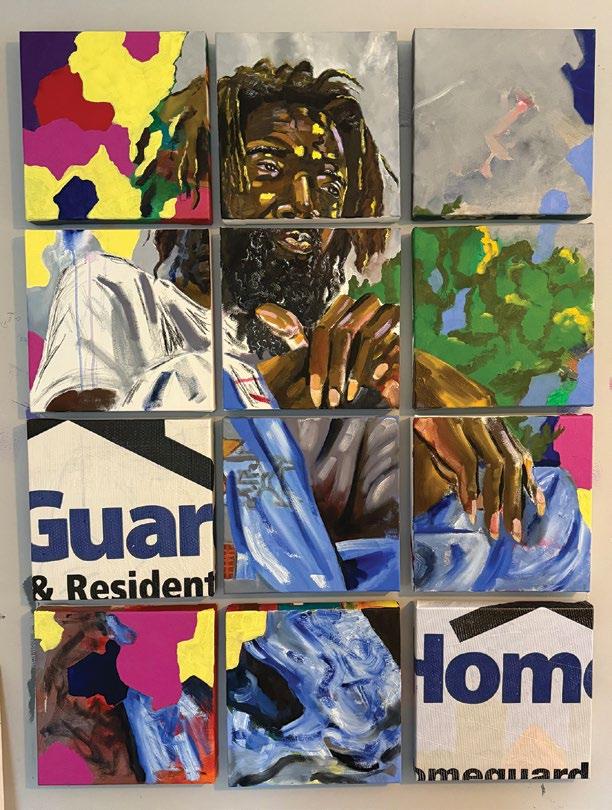
effect of familiar spaces seen through repetition rather than detailed observation. The scene is both familiar and undistinguished, a nowhere you can find everywhere in suburbs across the country. Among the show’s most striking pieces is “Roma’s” — a portrait of B that Booker painted on a Roma Pizza & Pasta pizza box.
“There’s been some major development lately right there in Bordeaux,” explains Booker.
“I’ve talked to him a little bit about it and he kind of pays attention to the stuff that’s popping up around him. He never really gives a heavy opinion on it, but he sees it. He hears it.”
Nashville’s development wave has already reached into the suburbs, and B is a native Nashvillian who represents a population with
nowhere affordable to live. “Guard Home” is a portrait of B assembled from 12 small paintings in pine frames — the same pale lumber used in house framing. The multimedia work incorporates swatches of the Home Guard brand polyolefin house wrap that’s a ubiquitous feature at Nashville development sites. After years of breakneck building, Nashville’s unhoused population grew by 4.1 percent since 2024. The reasons for this are as complicated as the overlapping social, economic and personal issues that converge in the stories told in these pages — and that Booker tells through his paintings of his neighbor and the Nashville he calls home. Be runs through Oct. 25 at Elephant Gallery.
Most of us Americans believe fiercely in individual ownership. This was primarily started by the feudal system in England. Lords and ladies decided they would privately own their property, rather than be the caregivers of all the people and animals in their territory. This started a huge people’s war in England, which you can read about elsewhere (e.g. Dreaming the Dar k; Starhawk, Appendix A). Part of that war led to a lot of us becoming Americans. As we know, the lords and ladies and many of their brutal ideas followed us here.
Although we want to retain our right to travel, or even move around, renters face the opposite problem. We are continually being booted out because of gentrification, higher rent, condemned buildings, or even, in Tennessee, because we are a bit behind on the rent. There are no renters rights in Tennessee. And everybody knows the old one about not being able to get along with one’s fellow co-renters in a house.
Of course, someone who has just moved recently may be having trouble paying all their bills, because the expense of moving, no matter how tightly you plan it or how many friends you ask to help, is going to cost. So the downward spiral for renters in Nashville consists of being forced to move on the average of once per year. Any mental health professional will tell you this counts as a major life stress. The temptation to knock it out with alcohol or other substances can grow over time. Re-
BY FREEPRESSGMA, CONTRIBUTOR VENDOR
peated moves destabilize things like keeping track of important papers or remembering where you put certain objects. (We call this, “running out of spoons” because about the third time you open the wrong drawer to find a spoon, you might just sit back down and say forget it. If you’ve had a long day at work, you know what I mean.)
It may mean just having to spend a few months figuring out where everything best fits in your new place. Very few renters can afford to take a week or two off work in order to get moved in properly. This can actually lead to things like being late for work, an inability to make proper meals ahead of time, kids stressing out because of changed circumstances, and other stressors like finding out that your best friend packed your work uniforms in the very bottom of the last box.
What would best serve us? By “us” I mean all inhabitants of Nashville.
Not everyone will be able to own a home. That is the way our economy is set up.
Gradually, alternatives to private property ownership have emerged. Here are some examples:
• Co-op apartment buildings. The best definition is a building that is jointly owned by a corporation made up of all its inhabitants.
• Land trusts. Land trusts can be either privately owned or public. It enables the dwellings or any construction on the property to remain under the aegis of
SUBMITTED BY HOWARD P., CONTRIBUTOR VENDOR
A former Marine Corps sergeant took a job as a high school teacher. Right before the school year started, he injured his back and had to wear a plaster cast under his shirt. The students didn’t know.
On the first day, he walked into the noisiest, rowdiest class in the school — the kind that eats new teachers alive. The kids, knowing he was a former Marine, were already planning to test him.
The Sergeant calmly opened the window, sat at his desk, and when a breeze blew his tie around, he casually picked up a stapler and stapled the tie to his chest.
The room went dead silent.
The rest of the year? Let’s just say discipline was never an issue again.
SUBMITTED BY JIM P., CONTRIBUTOR VENDOR
“The more you know, the more you realize you know nothing.” - Socrates via Plato via Jim
the land trust contract. These contracts usually give the owners of the buildings there many rights, including the right not to be kicked off of their property, without being an actual owner of the land. People can be granted long-term leases, such as a 99 year lease that will allow an entire generation to function on the property without fear of being booted out, unless they violate a law.
• Tiny Houses. Tiny Houses are structurally far more sound than an RV, can be self-sufficient in their energy and water supplies, and are flexible as to where they can be placed. Tiny Houses can be placed without disturbing old trees or landscaping, with minimal plumbing, and sometimes even without grid electricity. A tiny house can be built for as little as $20,000 or as much as $175,000. These prices are well below the average price to build an apartment, a house, or a mansion. The tiny house can be placed on marginal land, meaning land that isn’t a proper dimension or shape for regular housing. They can also be used as infill. People who are aging out, single parents, or busy professionals who need more help with their property find this to be of great benefit. They can get someone who is able to help them with their property, and the person in the tiny house pays little or no fees. Additionally, if a person must move their tiny house, the disruption is
minimal on two fronts – the person can just put a few things away in the house, hitch it up and move it. There will not be much of an adjustment when it comes to settling back in. If they can find a space near their work, even better. Not nearly such a problem for a tiny house.
• Federal Housing. Our funds were cut off in the ‘80s and robber barons siphoned them out of our banks. Google might or might not cough up all these stats readily.
• Sweat Equity. A person can offer to work for an owner in exchange for partial or full ownership of the property or auxiliary building at some point. Which brings me to my bright idea. Why not reward property owners who allow a rent to own contract? The concept of rent came into being when people started to travel more. Also, when private property came into being, people could charge rent! But really, someone who is staying for a number of years or would like to stay for the duration of their work life, should be able to request a lease-to-own agreement. The majority of their rent should go to paying down the capital on the property. If Davidson County were to adopt these measures as policy, then everyone’s quality of life would improve. The wealthy could stop worrying about indigence, the indigent could stop worrying about where they’re going to stay, and the stability would also create financial wealth that would contribute to our overall economic health.
BY WILLIAM B., CONTRIBUTOR VENDOR
Well, they took out the stimulator in my side recently because it had caused me a lot of trouble. There was a recall on it. I’m worried now what else they might have to take out. I’ve been doing therapy in my legs and my hips. I’m having an MRI on those and may have to have more surgery on them as well. The hip is really causing a lot of pain. It hurts my neck. I’m hoping in years to come they can take out my titanium screws in my neck. I had pneumonia here recently and I’ve wanted to try and come to the Contributor paper meetings, but I’ve had so many appointments recently.
I lost my brother recently too and I saw him in my dreams the other night. Anyone who loses a loved one it’s really hard to get over it. When you haven’t seen them as much as other members of your family it can really affect your life. Of my 76 years I was locked up for 50 something years. The thing is, I’m in a good place now with my life. I’m waiting to go to heaven. I’m not in a hurry for the Lord to come after me, but whenever he’s ready I’ll be ready.
I’ll be 77 soon and I want my story to help people with the things I’ve been through in my life. I have more PTSD than anyone I know. It can be hard on your nerves and real bad on your health.
What really hurts me in life are those I lost tragically like my baby sister by fire and my brother getting murdered, and my brother Wayne who went in his sleep in a heart attack. He hated me going out of the world. I couldn’t live at home because of him. I

was on drugs so bad then I didn’t care about nobody or nothing. Now I have 21 years clean off of drugs and alcohol and it really feels good.
I just completed 14 years of living at Room In the Inn. I go to my church and they buy me root beer candy to keep me from smoking cigarettes. Thank you to my customers for helping me be able to buy my medicine and food. I’m selling The Contributor now across from the old Ryman Auditorium. I am still playing the spoons. I missed out on auditions for America’s Got Talent and The Voice this year, but hopefully if anyone can figure out when they are going to do the blind auditions for any of those can you get in touch with The Contributor for me? The Lord gave me talent and I want to express it as much as possible.
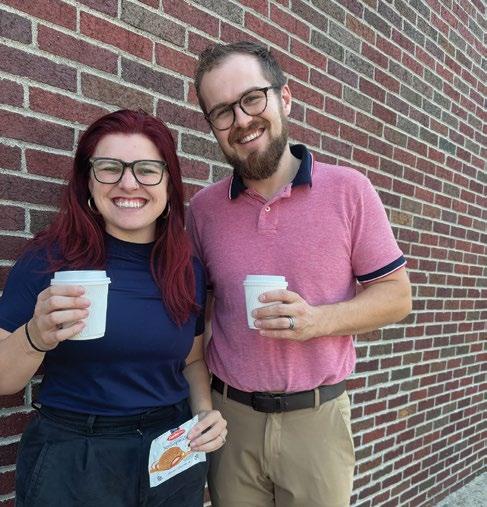
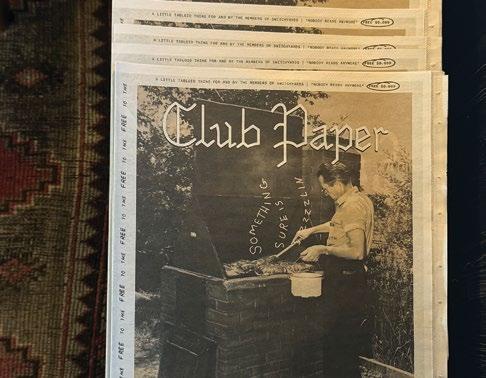

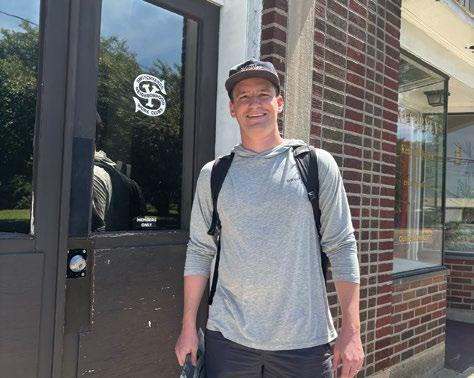
Various workers & members of Switchyards, a neighborhood work club, have told me it’s considered a “safe-space” for them. An individual can pay $100 to have access to all Switchyards clubs in America. At this time, Switchyards has 30 clubs and five are right here in Nashville. At the club it’s possible to meet people from all over the country because of the community aspects. It’s easy to become a member. Just get online and apply with that app. Once you’re a member, the app allows anyone that’s a member to simply tap to enter any club across the country.
Switchyards calls itself a neighborhood work club. It isn’t searching for buildings to demolish and build up as is trendy in Nashville, but what they do is take buildings of historical significance in different areas and bring in the warming environment of a safety net work/study energy place. A place that has free WiFi, coffee, snacks, separate meetings spaces and areas to take and make conference calls. The neighborhood club allows people to have the access of sharing with one another and the single focus mindsets of
accomplishing their goals that’s needed to move forward. This same type of safe haven that has been mentioned about here in Nashville is known in other cities in the country as well. One of the participants I met in Nashville found out about it through a family member in the ATL. So it’s the Super Safe Haven place to work/ study. Some say it’s almost like a 24-hour coffee shop. What place is there better to be than a super safe haven? Good WiFi, good coffee, good snacks, good company and 24/7 access. Switchyards neighborhood work club just can’t be beat.
Many of today’s people you see don’t love all the people Jesus loved. Jesus said in John 21:17, “A third time he asked him, ‘Simon, son of John, do you love me?’ Peter was hurt that Jesus asked the question a third time. He said, ‘Lord, you know everything. You know that I love you.’ Jesus said, ‘Then feed my sheep.’” Ya see, Jesus loved everyone. As often as you care for the lead of these, you will have done the same to Jesus Himself. I guess what I’m saying is that love every-
BY JOHN H., CONTRIBUTOR VENDOR
one just as Jesus did. Just the other day I was leaving home. I was about to get on the elevator and a guy in a wheelchair, who stays at the end of the hall. This gentleman told me I shine like a light. He said, “John, I don’t know a lot about you, but I can tell you have a heart out of this world. I don’t know how you do it.” He started to cry. He went on to say, “How can you keep such a good around all these hateful people here?” I replied, “You can’t change
God’s children. If I was in a bad move, I’d be in my apartment by myself, and believe you me, I wouldn’t come out till II’m myself again. You have to keep that loving attitude. In other words, we have to be an example.
I’m not sure how you people may feel, but when it comes to loving our neighbor, there’s a catch. This is something we must do to be able to love God. Take my advice: get on your knees and ask God to help you before it’s too late.
SEAN L., CONTRIBUTOR VENDOR
“You Might’ve Missed the Monkey” In today’s wide world full of people, people plan to have plenty to do. Flings to follow fly freely from anywhere Hardly half holding anything true. So, though surely you’ll simply “just show” me, and guarantee things are good to “go through”, You might’ve just missed your monkey, Because Brother, he’s looking like you!
It matters not — to me, to be your rubber, or your glue;
For same as you have your plans, I’ve plans of my own too.
Best, believe ye I’ll be not your fool, Since I see one and one still is two; And the next time you’re needing a monkey, First, take a stop by the zoo!
BY SHAWNA B, CONTRIBUTOR VENDOR
Blood never runs dry for the military.
Blood never runs dry for the families.
Blood never runs dry for everyone.
Blood never runs dry for animals.
Blood never runs dry for freedom.
Blood never runs dry for the country.
Blood never runs dry for the nation.
Blood never runs dry for the whole world.
Blood never runs dry For every country.
Blood never runs dry For all the continents.
Blood never runs dry for every race.
Blood never runs dry for every gender.
LORA V., CONTRIBUTOR VENDOR
It’s Summertime with temps reaching 110 degrees. There’s plenty of water being passed out, but half is hot, not cold.
Are the homeless people second class citizens that don’t need or deserve cold water? We need and like cold ice water like everybody else that have what they need in life.
Financial crises are periods characterized for some by devastating losses of income, work, a certain future and a stable family life. The effect on mental health can be catastrophic.
Financial crises are periods characterized for some by devastating losses of income, work, a certain future and a stable family life. The effect on mental health can be catastrophic. But what does the evidence tell us about who is most at risk, and in what ways?
We are the first team to do a systematic review of global research linking financial crises and mental harms. The evidence from almost 100 eligible studies (out of nearly 7,000 we considered) shows that these crises have consistent, long-term negative effects on the wellbeing of whole groups of people, including increases in depression, anxiety and risk of suicide.
But not everyone is affected equally. Your gender, age, job and whether you have children are all key factors in determining how vulnerable you are to the stress and poor mental health associated with financial loss and insecurity.
Manual workers (such as farmers, tradespeople and those working minimum-wage jobs) are vulnerable as they typically have less of a safety net, while small business owners are particularly susceptible to financial pressures and worries.
People at either end of the age spectrum are also more vulnerable as they have fewer resources. Others at higher risk include families, people with lower levels of formal education and those with long-term health conditions.
Suicide mortality rates increase both during and after periods of financial crisis — a risk that is always higher among men.
However, women are more at risk of suffering poorer mental health in general during a financial crisis, as they tend to take on more responsibilities both at work and home — including increased emotional labour supporting others who may be struggling financially.
Stigma, stress and social roles
Our research highlights three broad challenges to the mental wellbeing of people struggling in a financial crisis. Understanding how to address them could help make people more psychologically resilient in the face of future financial downturns. Here are some recommendations based both on the study’s findings and our combined research knowledge and expertise in health psychology.
1. Social stigma and support
The stigma of mental illness is decreasing in many societies as we’ve become more comfortable talking about our wellbeing. It’s less clear, though, if we are okay talking about our finances. Encouraging people to be more open about financial distress with trusted
BY BEN GIBSON, JEKATERINA SCHNEIDER AND MARK FORSHAW

friends, family members and partners, free of any judgment, can be especially important during periods of economic uncertainty.
Higher levels of trust in other people offer another defense against mental distress during periods of financial crisis. The reduced stigma around discussing mental health and suicide can buffer against some of the most devastating outcomes. Research shows that talking about suicide can save lives.
2. Stress and insecurity from loss of resources
Even if your job feels secure, financial downturns can lead to increasing pressures at work as a result of greater workloads and reduced staff.
If you are an employee, check whether your employer subscribes to an employee assistance programme that delivers legal and financial advice and psychological support when needed.
Alternatively, join a union – most provide legal advice and financial support. Practical support for business owners is also available.
When feeling threatened with loss of income or job security, connecting with people in similar positions both in-person and online, such as via parent groups, can help you feel you’re not alone and is a good
way of sharing resources. You should also be able to get help from your local council.
3. Challenges to identity, social roles and meaning
Losing your job or income understandably damages your sense of self. But identity and meaning can be found in various aspects of life, not only work.
Be careful not to think of yourself as “just one thing” — whether a breadwinner or a carer — as this can create a sense of fragility. Strive to find greater meaning through family, hobbies, organizations and community work.
We also all need to encourage understanding that it’s not the sole responsibility of women to be the emotional caregivers in families and other care situations — a perception that can damage their sense of identity. Household work and childcare should be divided as evenly as possible at all times, but especially among periods of crisis when people are feeling highly stressed.
Declines in mental health should not be regarded as an unavoidable cost of financial crises – this is wrong economically as well as morally. Supporting a nation’s wellbeing could save a struggling economy billions by reducing mental ill -
ness-related sickness and disability, and ensuring that optimal work practices can continue.
Our review highlights that the way societies are structured affects the impact of financial crises on their populations’ mental health. It is perhaps not surprising, for example, that countries with particularly strong welfare systems, such as Iceland, reported minimal to no increases in suicide rates following a financial crisis.
At a national level, having strong welfare, accessible health services and progressive attitudes towards mental health are shown to reduce suicide and mental illness. On an individual basis, reaching out to others, having supportive social networks, rethinking our identities and developing financial knowledge may help us all weather current and future crises.
Whatever stage in life you are in, it’s a good idea to familiarize yourself with available mental health services. In the UK, for professional help, contact your GP, use the NHS e-referral platform or check out the NHS talking therapies services. Charities and organizations such as Mind, Samaritans and the Mental Health Foundation also provide expert advice and professional support.
Courtesy of The Conversation / INSP.ngo
Created by Mccollonough Ceili
Here are some riddles to tickle your brain.
Where can you go without leaving where you are?
What has arms and legs yet no head?
A trickier one for you to try: What is weightless, can be seen with the naked eye, and when put in a barrel it will make the barrel lighter?
apple battery cartoon drawing elevator feather grow hope igloo justice kind lemon memory nice Elevator will have an extra space at the end.


Sometimes I think about that part in Hamlet, where Ophelia says “We know what we are, but know not what we may be.” Because Ophelia was having a particularly bad day when she said that. And, honestly, a lot of the other things she was saying didn’t make much sense to me. Something about the baker’s daughter being an owl and rue being an “herb of grace.” It all seems very abstract. But then she says something heavy like “We know what we are, but know not what we may be.” Which, Libra, is something you may want to argue with, but I think it’s basically the root of all our fears. And if we can make some peace with that idea maybe we can take one more step away from the water and away from the fate of Ophelia. And take one step toward hope and away from fear.
People are saying it’s not the right time to talk about it yet, but I think we’re ready. Let’s just get it out there. I’ll say it. What are you going to be for Halloween this year, Scorpio? You could go with something cheap and easy like a prepackaged drugstore construction worker. Or something complicated like Elizabeth Taylor in Jewel of the Nile. Maybe do something obscure like an embodiment of the feeling of shame. Or a fan favorite like Disco Dracula. Whatever you want to be, Scorpio, it’s not too early to make a plan and take some steps. Even if you just want to be happier.
My Aunt told me it was a moonstone. The smooth, round, pale iridescent rock she handed me seemed like something unearthly. So when I took it to school I didn’t think it was a stretch to tell my friends I got it from the moon. They mostly believed me and so I told them that I knew how to get more stuff from the moon if they wanted. But Brett Sneed had to ruin the whole thing, shouting “That’s just opalite! Those are twenty-five cents at my dad’s store!” My new popularity instantly vanished. And I know it’s tempting, Sagittarius, to say more than you know. But Brett Sneed is still out there and those illusions do pop. Start with the basics and stay with what’s true. It’s a neat rock. Wanna see? You can hold it if you want.
As an amateur astrologer, Nostradamus is sort of a father figure to me. Not because I think he was such a great guy or anything. And not because his predictions came true, exactly. Not even that I’ve really “read his work,” as they say. But Nostradamus taught me that if you think of something scary that might happen in the future, you don’t have to worry about it all day. You can just write it down. See if it works for you, Capricorn. Instead of just fearing your fears, write about them. You can make a quick bulleted list or do a whole essay for each one. You might notice that some aren’t that scary once you’ve got them spelled out. “Stink Bees?” Why was I afraid of “stink bees?” What even is that? And, worst case, if they do come true, you might get famous later like Nostradamus. Just write it down.

I remember Peter Pan as the story of a fun-loving boy who can fly and can fight and can never grow up. But lately it just looks more to me like the story of Wendy, the eldest daughter of the Darling family. A sharp, responsible, sensitive girl who feels she has to keep the whole world from falling apart for everyone she knows. You may find you’re getting tired of the reckless adventures that put the people you love toward danger. You may find you’re taking on too much responsibility for their well-being. You may find somebody to talk that over with this week, Aquarius. Skip the next round of fairy dust and happy thoughts and figure out what your role here really is and how you might want to change it.
I wanted to buy the whole animatronic skeletal rock band from the Halloween Super Store in the abandoned car dealership off Exit 728b. But I didn’t have the budget for all four members, so I only bought the drummer. Now he sits in my yard with his legbone drumsticks and his three skull-toms. And when I get home it sets off his motion sensor and he plays Bad to the Bone, but I can tell his heart’s not in it. I guess I was only thinking of myself when I took him away from the band. I didn’t mean to ruin the friendship and camaraderie that John Boneham must have had with those other undead rockers. Who helps you play your best, Pisces? Are you taking that companionship seriously? Life can’t always be a drum solo.
I used to think John Carpenter’s 1982 film The Thing was pretty scary. All that evil alien goo and human paranoia. But now I think maybe it’s actually romantic. A life form from a far away place that just wants to be seen as one of us. It does whatever it takes to be accepted, welcomed, perhaps even loved by the crew of that lonely Antarctic outpost. What would you change about yourself to be accepted by somebody else, Aries? Sometimes it’s real kindness. Learning to pick up your socks or do the dishes even though you don’t want to. But don’t change who you really are, Aries. Not for anybody. That just leads to suspicion, resentment, and flamethrowers.
So The Kraken is just like a big fish, right? Or is it more of a giant octopus-guy? I’ve never known. All I’m sure of is that it’s very large and at least partially aquatic. Oh, and it’s on my wish list (tacked to my visionboard) that I want to be the guy to shout “Release The Kraken!” and then have those giant gates burst open with a flood of water and tentacles. It’s probably not a very realistic aspiration, but I still put it on the list. It’s right after “learn to play banjo” and right before “be a better friend.” What’s on your list, Taurus? Release that.
I was getting my Halloween decorations out of the basement and as I pulled the box away from the cinder block wall, a flat piece of wood fell down from behind it. It’s maybe an old shingle from the house that used to be here. Anyway, It’s got a picture burned into it, some kind of smiling face with horns and sharp teeth under the word “BEWARE.” Oh, and on the other side there’s a carved photorealistic likeness of you, Gemini. Yeah, I’m sure it’s you! Did you have any relatives in this area in the late 1800s? Anyway, I just thought I should let you know that you’re probably part of some stories you don’t even know about. That’s why you should be kind whenever you can. People remember. Other things do too.
After more than a decade of dedication, I cancelled my membership to PASTAA (The Public Association of Semi-Trained Amateur Astrologers) because I simply couldn’t continue to support an organization whose financial investments were so out of line with my personal beliefs. (Also, I had already gotten all the pens and stickers they had to offer and I wasn’t really using the message board anymore.) These are complicated times, Cancer. Sometimes you can do something small to signal to the market what you won’t tolerate. Sometimes it’s not so easy. (I’ve decided to keep paying my electric bill despite… well, everything.) Opting out of harmful systems is good. But if those lines are too hard to cut right now, just opt-in to something you know is worthwhile. Even things that don’t come with a membership card. Like helping your neighbor fix that old fence or giving your coworker a ride home.
I saw a headline that says our consciousnesses may be able to travel through time and that’s why we get “gut feelings” that something bad is about to happen. Like, today I had a feeling that I shouldn’t eat my peanut butter and honey sandwich in the car, but I did it anyway and ended up with honey all over my work shirt. I’m not sure if I got that worried feeling because of my time travelling consciousness or just because I have a long history of dripping stuff on all my best clothes. Either way, Leo, listen to your gut. Even if it doesn’t know what’s gonna happen next, it might know what’s happened before.
When I think of how many hours of TV I’ve watched in my life, my only comfort is that there’s so much TV I’ve still never seen. But I do so love the way a TV series can progress. Episode to episode. Season to season. The writing style and characters developing and changing over the life of a show. “Girl Meets World,” for instance, was a 2014 Disney Channel spin-off hit featuring Sabrina Carpenter, Rowan Blanchard, and Ben Savage of “Boy Meets World” fame. And although I’ve never seen a single episode, I believe that it had stories worth following. That the characters changed, if only a little, as the series moved forward. And that all the stories we tell, no matter how small or specific, are stories about all of us. And that they change. And so can we.
Mr. Mysterio is not a licensed astrologer, a trained Antarctic researcher , or an authorized lawn-skeleton reseller. Listen to the Mr. Mysterio podcast at mrmysterio. com Or just give him a call at 707-VHS-TAN1.








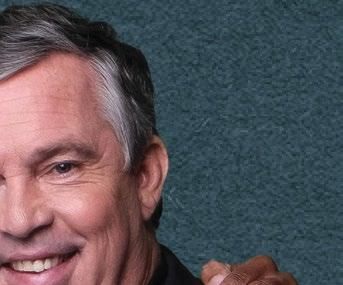















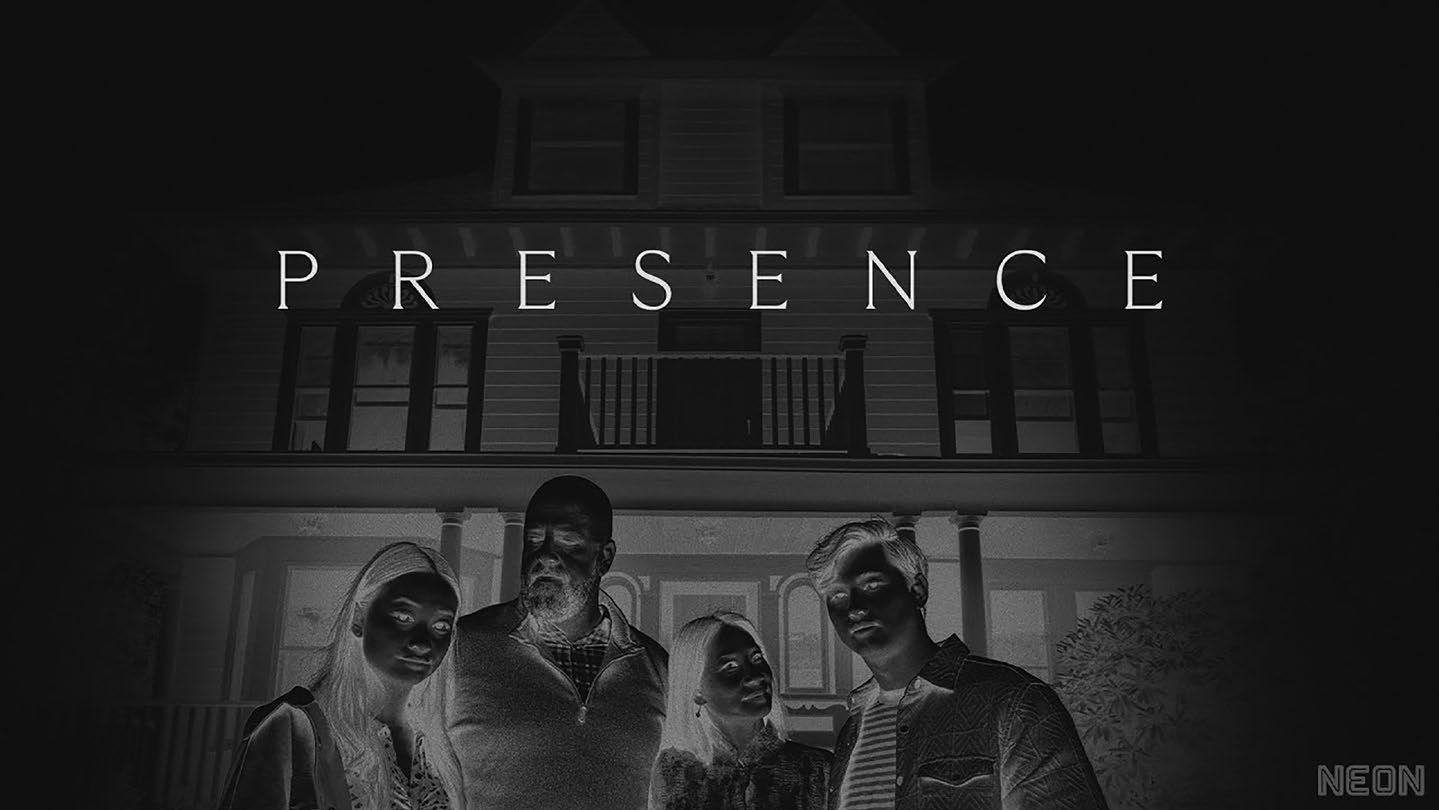
Steven Soderbergh is famous for also doing the camerawork in the movies he directs, and Presence might be the biggest-ever flex from Soderbergh the cinematographer. From the opening frame of the picture, the filmmaker gives the audience the point of view of a ghost haunting an empty house. The camera sweeps from room to room. Dawn is breaking and the neighborhood is just visible outside the windows. The noises of ramping rush hour are just starting to hum. It’s a performance of a kind — sometimes almost a dance. The first director cameo played from behind the camera. When the Payne family moves into their new suburban home, they’re unaware they’re sharing the space with an unseen entity that provides the audience with a window into their unraveling lives.
Rebecca Payne (Lucy Liu) runs the household with executive efficiency, while her husband Chris (Chris Sullivan) is the family’s emotional core. They have a teenage son named Tyler (Eddy Maday) who’s a local swimming champion and a big man
BY JOE NOLAN, FILM CRITIC
on campus at his high school. Tyler’s little sister Chloe (Callina Liang) is a sensitive kid dealing with grief following a friend’s recent death. The supernatural presence seems particularly interested in Chloe, who possesses an intuitive ability to sense things others can’t.
Presence came out in January, just a few months after Here debuted last November.
Robert Zemeckis’ film portrays passing generations using a camera fixed in one spot of a house. Here and Presence engage in opposite strategies, but both feature extreme kinds of camerawork to create formalist domestic portraits. Zemeckis’ film is based on a graphic novel, and while a fixed point of view might be an interesting twist for a story told with still illustrations, it’s a supremely constricting gimmick for cinema. Soderbergh’s experiment is much more compelling because his spectral cinematography serves the purpose of flipping the script on haunted house storytelling, making the audience empathize with the ghost.
As the Payne family’s tensions simmer — marital strain, sibling rivalry, parental favoritism — the ghost observes from corners and doorways. The spirit occasionally makes its displeasure known through toppled objects and strobing lamps. The real estate agent (Julia Fox) who sold the Paynes the house becomes an unwitting catalyst to the events in the film, while a local medium (Natalie Woolams-Torres) arrives to investigate the supernatural activity.
The film’s most unsettling elements emerge through Tyler’s friendship with Ryan (West Mulholland), a troubled newcomer whose interest in Chloe carries sinister undertones. The presence watches their interactions with increasing agitation, building toward moments where the otherworldly and the everyday collide.
Callina Liang’s Chloe is a highlight in this cast. Her subtle glances directly into the camera are perfectly calibrated to inform viewers of her sensitivity to the presence while also slowly ratcheting up the chills. It’s great to see Lucy Liu back
on the big screen, but the nontraditional relationship dynamics between Rebecca and Chris feel forced and contrived. If Rebecca is this brilliant, ambitious and successful, how would she ever end up with a marshmallow like Chris?
The film’s 85-minute runtime unfolds in short shots and long takes that read like scenes from a play. Presence captures the shifting dynamics in family relationships while maintaining an atmosphere of mounting dread. Soderbergh’s camera floats through rooms and eavesdrops on conversations with spectral curiosity. However, what begins as a traditional ghost story gradually reveals deeper layers about protection, sacrifice, and the lengths we’ll go to for those we love.
Presence is streaming on Hulu.
Joe Nolan is a critic, columnist and performing singer/songwriter based in East Nashville. Find out more about his projects at www.joenolan.com.
